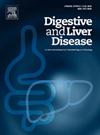Contrast-enhanced intraoperative ultrasound improved hepatic recurrence-free survival in initially unresectable colorectal cancer liver metastases
IF 4
3区 医学
Q1 GASTROENTEROLOGY & HEPATOLOGY
引用次数: 0
Abstract
Background
We aimed to evaluate the role of Contrast-enhanced intraoperative ultrasound (CE-IOUS) with perfluorobutane microbubbles (Sonazoid) in improving the prognosis of patients with unresectable colorectal cancer liver metastases (CRLM).
Methods
A total of 130 Patients with unresectable CRLM who underwent curative hepatic resection at our institute were retrospectively analyzed. Of these 130 enrolled patients, 67 underwent intraoperative ultrasound alone (IOUS group); 63 underwent additional CE-IOUS and IOUS (CE-IOUS group). Normalized inverse probability treatment weighting (IPTW) was employed to balance baseline characteristics between groups. Hepatic recurrence-free survival (HRFS) and overall survival (OS) were compared.
Results
The treatment strategy was altered in 25 patients (25/63, 39.9%) due to the additional use of CE-IOUS. After applying IPTW, the CE-IOUS group exhibited a significantly lower rate of hepatic recurrence (hazard ratio [HR], 0.55; 95% confidence interval [CI] 0.32–0.95; P = 0.032). Subgroup analysis showed that CE-IOUS provided a significant benefit over IOUS in patients with bilobar liver metastases (P = 0.007), or with a number of live tumors < 3 (P = 0.021), or without DLM (P = 0.018), or with extrahepatic metastasis (P = 0.034), or with a minimum of 6 cycles of systemic therapy (P = 0.03).
Conclusions
CE-IOUS is necessary for unresectable CRLM after preoperative chemotherapy, as it enhances detection accuracy and improves the prognosis of unresectable CRLM patients.
对比增强术中超声提高了最初无法切除的结直肠癌肝转移灶的无肝复发生存率。
背景:我们旨在评估使用全氟丁烷微气泡(Sonazoid)的对比增强术中超声(CE-IOUS)在改善不可切除结直肠癌肝转移(CRLM)患者预后方面的作用:回顾性分析了在我院接受根治性肝切除术的 130 例不可切除的 CRLM 患者。在这 130 例患者中,67 例仅接受了术中超声检查(IOUS 组);63 例接受了额外的 CE-IOUS 和 IOUS 检查(CE-IOUS 组)。采用归一化反概率治疗加权法(IPTW)平衡各组间的基线特征。比较了无肝复发生存期(HRFS)和总生存期(OS):结果:25 例患者(25/63,39.9%)因额外使用 CE-IOUS 而改变了治疗策略。应用 IPTW 后,CE-IOUS 组的肝复发率明显降低(危险比 [HR],0.55;95% 置信区间 [CI],0.32-0.95;P = 0.032)。亚组分析显示,在双叶肝转移(P = 0.007)、活瘤数小于 3(P = 0.021)、无 DLM(P = 0.018)、肝外转移(P = 0.034)或至少接受过 6 个周期全身治疗(P = 0.03)的患者中,CE-IOUS 比 IOUS 有明显优势:结论:CE-IOUS对于术前化疗后不可切除的CRLM是必要的,因为它能提高检测的准确性,改善不可切除CRLM患者的预后。
本文章由计算机程序翻译,如有差异,请以英文原文为准。
求助全文
约1分钟内获得全文
求助全文
来源期刊

Digestive and Liver Disease
医学-胃肠肝病学
CiteScore
6.10
自引率
2.20%
发文量
632
审稿时长
19 days
期刊介绍:
Digestive and Liver Disease is an international journal of Gastroenterology and Hepatology. It is the official journal of Italian Association for the Study of the Liver (AISF); Italian Association for the Study of the Pancreas (AISP); Italian Association for Digestive Endoscopy (SIED); Italian Association for Hospital Gastroenterologists and Digestive Endoscopists (AIGO); Italian Society of Gastroenterology (SIGE); Italian Society of Pediatric Gastroenterology and Hepatology (SIGENP) and Italian Group for the Study of Inflammatory Bowel Disease (IG-IBD).
Digestive and Liver Disease publishes papers on basic and clinical research in the field of gastroenterology and hepatology.
Contributions consist of:
Original Papers
Correspondence to the Editor
Editorials, Reviews and Special Articles
Progress Reports
Image of the Month
Congress Proceedings
Symposia and Mini-symposia.
 求助内容:
求助内容: 应助结果提醒方式:
应助结果提醒方式:


